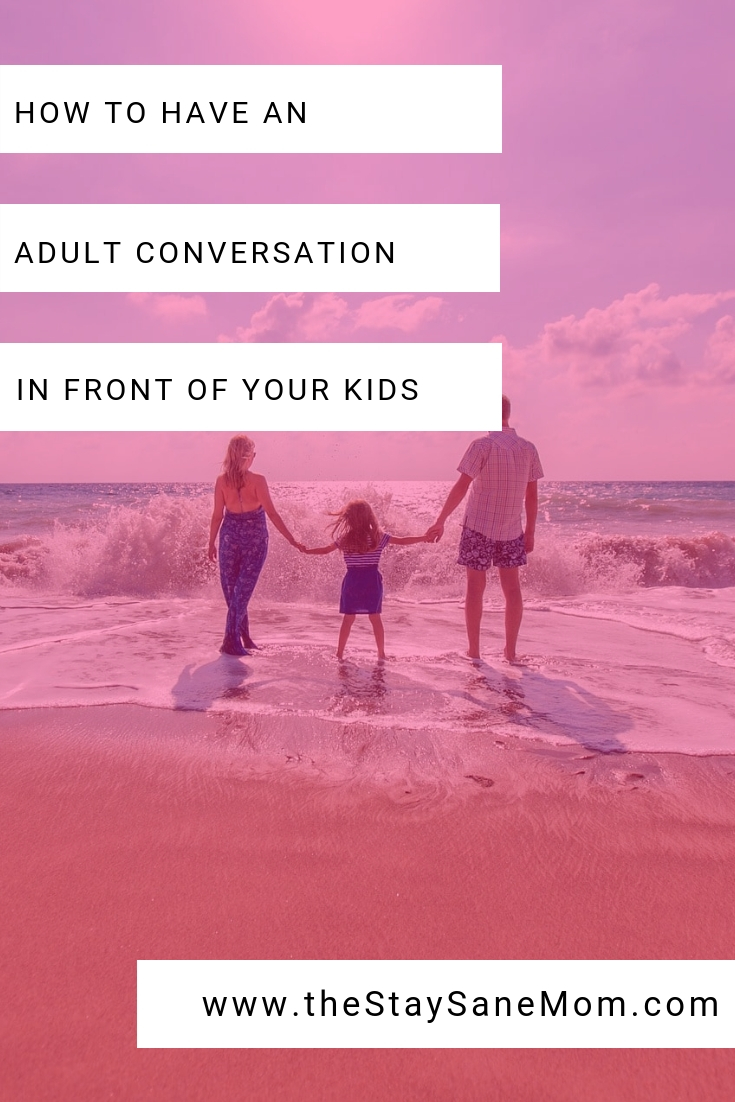How to Have "Adult" Conversations in Front of Your Kids

How to Have "Adult" Conversations in Front of Your Kids
It's incredibly challenging to have any conversations with your spouse while your kids are there. Here's the quick and dirty guide for how to have an important conversation in front of your kids, and when it's really important not to do so.
Written by Liz Bayardelle, PhD | See Comments | Updated 04/13/2019
Want to cut to the chase?
Daily Battle Plan

How to Have "Adult" Conversations in Front of Your Kids
This post contains some affiliate links for your convenience. Click here to read my full disclosure policy.
One of the hallmarks of any good marriage is communication. This is drilled into all married couples from the time you walk down the aisle.
However, good communication becomes much more challenging when you have one or more sets of tiny ears that seem to be present and listening at the worst of times.
It's incredibly challenging to have any conversations with your spouse while your kids are there, listening, interrupting, and demanding your attention.Add to this an important conversation, one in which the spouses might potentially disagree, or one about a serious topic and it is truly a mess to attempt to have a serious conversation in front of your kids.
However, it's also not an option to take half an hour to have a conversation in a private room, because someone has to be watching the kids and you two are often all there is.
Here's the quick and dirty guide for how to have an important conversation in front of your kids, and when it's really important not to do so.
When Not to Talk In Front of Your Kids
There are two broad categories of conversations that really just need to wait for private space:
-
Conversations that portray mom and dad on different teams
-
Conversations that include material the kids shouldn’t hear
These conversational topics are pretty broad, But any conversation that fits into one of these two categories really does just need to wait until you have a couple minutes of privacy. If it has to happen right then, set the kids up with an activity and have a very brief whispered conversation in the laundry room, but under no circumstances should you try to handle these two in front of little ears.
Conversations Painting Mom and Dad on Different Teams
First, conversations that portray mom and dad on different teams could be anything from marital arguments to discussions about how to punish a teenager who stayed out past curfew.
It doesn't matter if Mom and Dad are together or separated, kids need to know that you to provide a unified front that can't be messed with, played, or worked against each other.
Any conversation that suggests to them mom and dad think differently about important topics, are arguing about something major, or are otherwise less than a united front need to wait until you two are in private.
As a stepmom, I've seen this play out with my stepdaughter, who always capitalizes on it when she senses her dad and her bio mom disagree on something. However, it is just as prevalent with our younger daughter, who’s only three and can already since when one parent is going to we can on an issue, even though the other one has already said no.
(You said I can’t have a lollipop? Dad said I can have one.)
Do whatever you need to do to make sure your kids know that you and your spouse are one united front. It will make a discipline, organization, and family harmony in general that much easier.
Conversations With Material They Shouldn’t Hear
This could be anything from information about future birthday presents to sensitive information about people your kids know to actual inappropriate conversational topics, and everything in between.
If you have to have a conversation in code, it's best not to have it in front of the kids at all.
Nothing makes a conversation sound interesting to eavesdrop on more than parents whose voices all the sudden get really really quiet or the obvious use of code words. (“I have to go do the thing...you know...the thing.”)
If you can't say everything that's happening in a conversation in a normal tone of voice and using standard vocabulary, it's best to pull your spouse aside really quickly and have a quick whispered conversation out of your kids earshot.
What to Do When You Do Talk In Front of Your Kids
With these two categories out of the way, I do actually advised having as many serious conversations in front of your kids as possible.
Kids need to know the thought that goes behind decisions that are made. They need to hear two reasonable adults debating possibilities or different courses of action. They need to understand how the “sauce is made”, so to speak.
However, this doesn't mean that you should freely speak in front of your kids without considering the words that are coming out of your mouth hole.
Children worry, and one poorly timed joke about how you might need to find an affordable family law center could freak them out in ways that are hard to repair.
Here's how to have serious conversations in front of your kids (without damaging them) in a way that could possibly teach them a few things about how adult life works.
Be Honest with Them
For me, the most important thing here is honesty. Your kids have an excellent radar for when you are and are not being genuine.
This is not because they have super powers or because you're a bad liar, It comes naturally when people live together for an extended period f time. They know your mannerisms, they know your habits, and they can tell when you're not acting the way you normally do.
For this reason, it's important that you double down on transparency and actually have an honest conversation, if you're going to choose to have it in front of them. Stage winks and crossed fingers are going to be picked up on quickly.
It's best to assume that your kids are a few developmental levels over what you think they're at. Are three-year-old can repeat back things that were said a couple days ago, even though she can't remember I told her to put on her shoes 30 seconds ago. Assume your kids are smarter than you think they are.
It's also good to assume that your kids can always hear you.
Our teenager has an almost magical ability to overhear conversations. She always has. She can be in the shower on the top floor and we can be on a different floor having a whispered conversation and somehow she still hears every word. It's uncanny.
To avoid awkward situations, it's best to assume your kids can always hear you.
Explain Things as You Talk
When you choose to have a serious conversation in front of your children, be aware that you are now teaching a class on how adult communication works.
You no longer have the luxury of moving in an adult pace, but you have to slow things down a little bit to explain or demonstrate how conversations are supposed to be had.
This can include things like intentionally repeating what the other person says and explaining that you want to make sure you understood it properly or or narrating what you're doing as you're doing it. what you're doing as you're doing it.
(Example: “I want to make sure we understand all the different ways to handle this, so let’s brainstorm different options now. We can throw out any ideas now, because we’re just thinking.)
Does it suck to have a conversation slow down by educational practices? Yep.
Is it necessary? You betcha.
This is the difference between your kids feeling like they just overheard a fight and coming out with an undermined sense of security and your kids learning how grown-ups actually talk and coming away with an improved emotional intelligence.
Watch Your Jokes and Snippy Comments
On that note, adults feature sarcasm and mean jokes in most of our conversations. At this point, life has let us drive any innocence we once had and we are now jaded, sarcastic, beings with incredibly dry wit.
This will all fly over the head of your child, who is still learning how to converse in basic English.
Don’t have a conversation in front of your child unless you are sure you can control your tongue and speak in a way you would be okay with them speaking. If you know ahead of time that you might get riled up during conversation, hold on to it until you're actually in a private space.
You don't know true regret and self-loathing until you have overheard your mean words parroted back out of your child's mouth.
Spend Some Quality Time Together After
Remember that your kid has a much lower emotional capacity than you do.
While you might be used to having adult conversations all the time, they are still quite new to it and it could be quite exhausting for their fledgling emotional development.
After you finish your conversation that you can tell was taxing for them, try to do something fun as a family to reassure their sense that everything is okay.
Head out for a picnic, to your favorite museum or playground, or just spend time in the garden painting and playing. Give them some quality time, and your full attention and it will help soothe over any negative emotions created by your previous “adult” conversation.
This will not only help them feel better in the moment, but it will also develop the pattern in their thought where you can have challenging conversations with someone, and everything is still okay. Everyone still loves each other, and the family was not eroded in any way by having a difficult conversation.
Start Your Next Step
Daily Battle Plan

Get Sanity, Delivered to Your Inbox.
Care to Share?




About the Author

Liz Bayardelle, PhD
Founder | Contributor
Liz (or Dr. Mommy, as her toddler started calling her after learning what a PhD was) is the happily sleep-deprived mom of a toddler (and professional raccoon noise impersonator), a sparkle-clad kidnado, a teenage stepdaughter, 200 cumulative pounds of dog, and herd of dustbunnies (if daily vacuuming doesn't occur). During nights and naptimes, she uses her PhD in business psychology as an author, speaker, and consultant. She also serves as an executive and principal for three companies, two of which she co-founded with her very patient (and equally exhausted) husband.





-Budget.jpg)